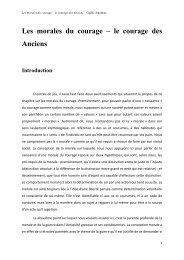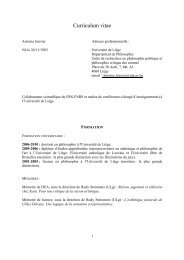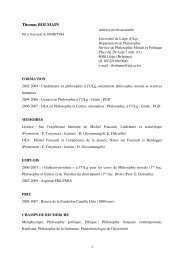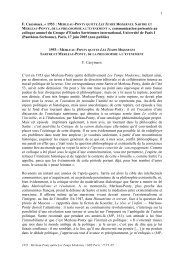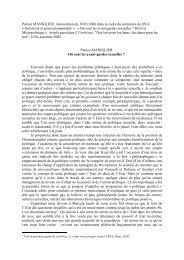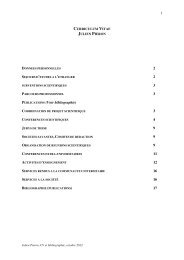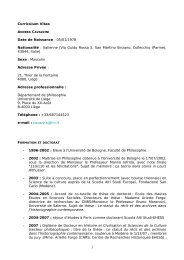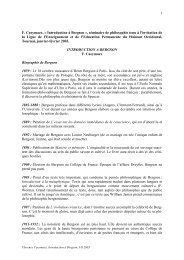Subjectivations politiques et économie des savoirs - Service de ...
Subjectivations politiques et économie des savoirs - Service de ...
Subjectivations politiques et économie des savoirs - Service de ...
Create successful ePaper yourself
Turn your PDF publications into a flip-book with our unique Google optimized e-Paper software.
– Revue <strong>de</strong> philosophie politique <strong>de</strong> l’ULg – N°5 – Mai 2013 – p. 124<br />
potentially subversive politics that flow out of the i<strong>de</strong>al of mo<strong>de</strong>ration. In the second<br />
part, I will consi<strong>de</strong>r what realizing mo<strong>de</strong>ration would entail politically, and then conclu<strong>de</strong><br />
by briefly highlighting one of the many insights we could draw from Plato’s reflections.<br />
As I noted above, apologists for mo<strong>de</strong>ration, albeit few, are not inexistent; some can be<br />
found in the ranks of green theorists, political economists, and theologians. Now, if<br />
green political theorists and left-leaning critics of greed or over-consumption tend to<br />
turn to state regulation when it is time to put forward solutions, theologians and social<br />
conservatives often opt to turn inward, to the soul. As I have just phrased them, these<br />
two types of « solutions » are, undoubtedly, oversimplified and overly strict arch<strong>et</strong>ypical<br />
positions. But they are still convenient for our purposes here, in that they tend to<br />
subsume emblematic « solutions » typically proposed, respectively, by the left and by<br />
the right. Now, Plato belongs neither to the left nor to the right. As this paper<br />
un<strong>de</strong>rscores, one of the insights that we ought to gather from Plato’s reflections on<br />
mo<strong>de</strong>ration is that state intervention without moral reform (and vice-versa) is<br />
insufficient, if not pointless. From a Platonic perspective, our economic crisis is the<br />
unsurprising consequence of a spectacular failure in law making and of a failure in<br />
character.<br />
Priests, sheep, chaste women and last men. Mo<strong>de</strong>ration and its critics<br />
« small people need small virtues... 14 »<br />
The word sophrosyne represents a challenge to translators. According to the classicist<br />
Arthur Adkins, no English word is a<strong>de</strong>quate to capture sophrosyne’s wi<strong>de</strong>-ranging<br />
meaning. 15<br />
T. G. Tuckey, in his classic translation of Plato’s Charmi<strong><strong>de</strong>s</strong>, similarly<br />
emphasizes that this curious Greek word « cannot be translated by any one word in<br />
English. It means wisdom, discr<strong>et</strong>ion, self-respect, mo<strong>de</strong>ration, chastity,<br />
temperance 16 . » Similarly, Marie-France Hazebroucq observes that: « la notion est<br />
13<br />
14<br />
15<br />
16<br />
The importance and interconnectedness of these two <strong>de</strong>finitions are un<strong>de</strong>rscored in the title of Helen<br />
North’s classic text on the subject: Sophrosyne: Self-Knowledge and Self-Restraint in Greek Literature<br />
(1966).<br />
F. Ni<strong>et</strong>zsche, Thus Spoke Zarathustra, trans. W. Kaufmann, New York, Penguin, 1966, p. 68.<br />
A. Adkins, « Polu pragmosune and "Minding One’s Own Business": A Study in Greek Social and Political<br />
Values », Classical Philology, 71(4), 1976, p. 302.<br />
T. G. Tuckey, Plato’s Charmi<strong><strong>de</strong>s</strong>, Cambridge, Cambridge University Press, 1951, p. 8-9.



